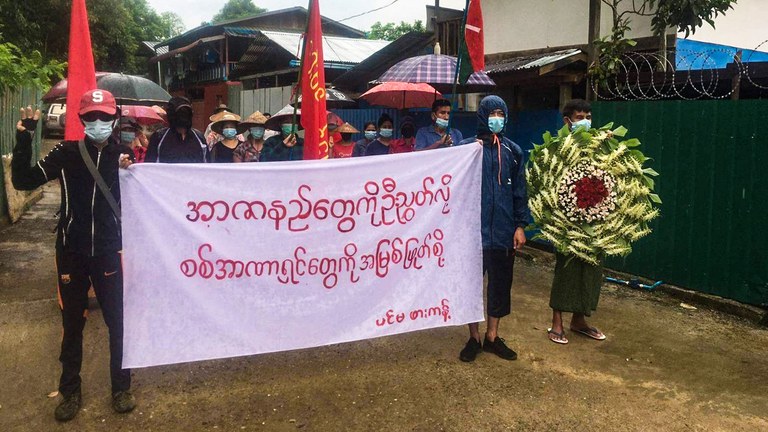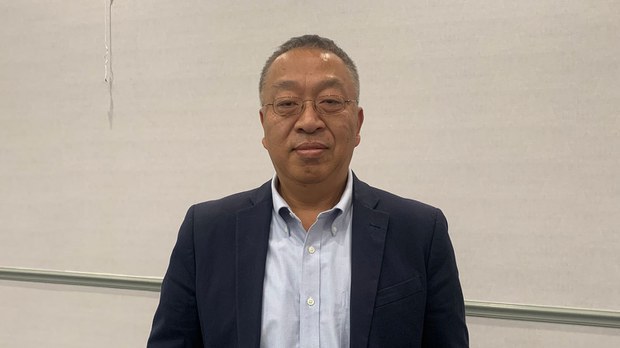Student detainees in Myanmar allegedly beaten, kept in solitary confinement
Four students imprisoned for protesting the ruling military junta have been held in solitary confinement and beaten nearly every day by authorities since being transferred to central Myanmar’s Bago region less than two weeks ago, their relatives and sources with knowledge of the situation said Thursday. Min Thu Aung, Banya Oo, Ye Htut Khaung and Zaw Win Htut — all students at Hpa-an University in Hpa-n, Kayin state — were arrested in March and charged with defamation of the state, organizing or helping a group to encourage the overthrow or destruction of the Myanmar military, and having contact with an unlawful organization, in this case an ethnic armed group fighting national forces. They each have been sentenced to 12 to 13 years in prison. The four students were among 60 other political prisoners who were transferred from Hpa-An Prison to Tharrawaddy Prison in Bago region on July 9. On instructions from the warden at Hpa-an Prison, the students were separated from the other prisoners when they arrived at the Bago detention center and placed in solitary confinement, a person close to one of the families told RFA. The four have been beaten and locked up in solitary confinement nearly every day since July 10, the youths’ family members and those familiar with the situation said. “They were not handcuffed when they were first beaten, though their ankles were shackled,” the person told RFA. Human rights violations in prisons, such as the beatings the students have experienced, have gotten worse since the military overthrew the democratically elected government in a February 2020 coup, said a spokesman for the Assistance Association for Political Prisoners (AAPP), a Thai NGO. “We have heard that political prisoners are being tortured intentionally and unjustly because they are political prisoners, and that they are being tortured in various ways,” he told RFA. According to AAPP’s records, junta authorities have arrested 11,743 civilians for civil disobedience activities, of which 1,344 were sentenced to prison terms, since the coup took place. When they were beaten while sitting without handcuffs, Banya Oo and Ye Htut Khaung tried to fight back, but were struck more forcefully, said the person close to one of the families of the detained students. They were then handcuffed, dragged away and locked in solitary cells. “They were taken out of the cells every morning and were beaten again,” the person said, adding that the guards taunted them, asking if their revolution against the junta had succeeded and telling them to say “We must win,” while continuing the beatings. The source said there were rumors that representatives of the International Committee of the Red Cross (ICRC) may visit the detention center to investigate the alleged mistreatment of the students. Prison guards removed the students from solitary confinement on July 18, though they are still suffering from injuries from the daily beatings and have not received medical treatment, he said. Another RFA source, who did not want to be named for security reasons, said all four men had serious injuries, including broken noses and head wounds and that one was beaten until his teeth fell out. RFA could not reach Prisons Department officials in Yangon or military junta spokesman Maj. Gen. Zaw Min Tun for comment. A statement issued by the ICRC in Myanmar on Monday said authorities must treat prisoners with dignity and humanity and ensure their health and safety. It also said the authorities had suspended ICRC access to prisons since March 2020 to check on detainees and provide humanitarian aid. ‘These actions are crimes’ The torture of prisoners is a serious human rights violation because the students have already suffered from being sentenced to long jail terms, said the father of one of the students, who declined to be named for safety reasons. “The kids have already been given punishments,” he said. “They haven’t broken any law or prison rules [since their arrests]. They didn’t even have any kind of prisoners’ rights and all these beatings are very serious violations of human rights. “We feel that this kind of mistreatment has become more serious after the military coup,” he said. “There’s no rule of law at all. No matter what the law says, people would be arrested and unjustly sentenced by the courts once accusations were made against them.” The students’ parents and relatives from Hpa-an requested permission to visit Tharrawaddy Prison, but prison authorities rejected their requests. Tun Kyi, a senior member of the Former Political Prisoners Society, said prison authorities have a policy of torturing political prisoners. “They are committing the most serious violation of human rights with the intention of subduing political prisoners so that they do not dare to rise up again,” he said. “They have laid out policies in various prisons, and then brutally oppressed and tortured the prisoners, often asking questions like, ‘Are you a revolutionary?’ and ‘Is your revolution making any headway?’ before hitting them.” Hpa-an and Tharrawaddy prisons, along with Yangon’s Insein Prison, are among the worst detention centers of Myanmar’s more than 40 jails, Tun Kyi said. A former prison warden, who did not want to be named out of concern for his safety, said the prison officials who mistreat detainees nowadays are former military officers. A legal expert from Yangon, who did not want to be named for the same reason, said that physical beating of any detainee, including political prisoners, is a crime according to the regulations governing prisons. “If you look at it as a lawyer, these actions are actually crimes because the jail manual states that prison wardens can give only 12 types of punishments,” he said. “No one else has the right to punish the prisoners. Among those 12 types of punishments that he can give, he is not allowed to beat prisoners.” Those who torture political prisoners will be held to account at some point, said the AAPP spokesman, who declined to be named for safety reasons. “Those who personally carry out the torture and all those who order…



